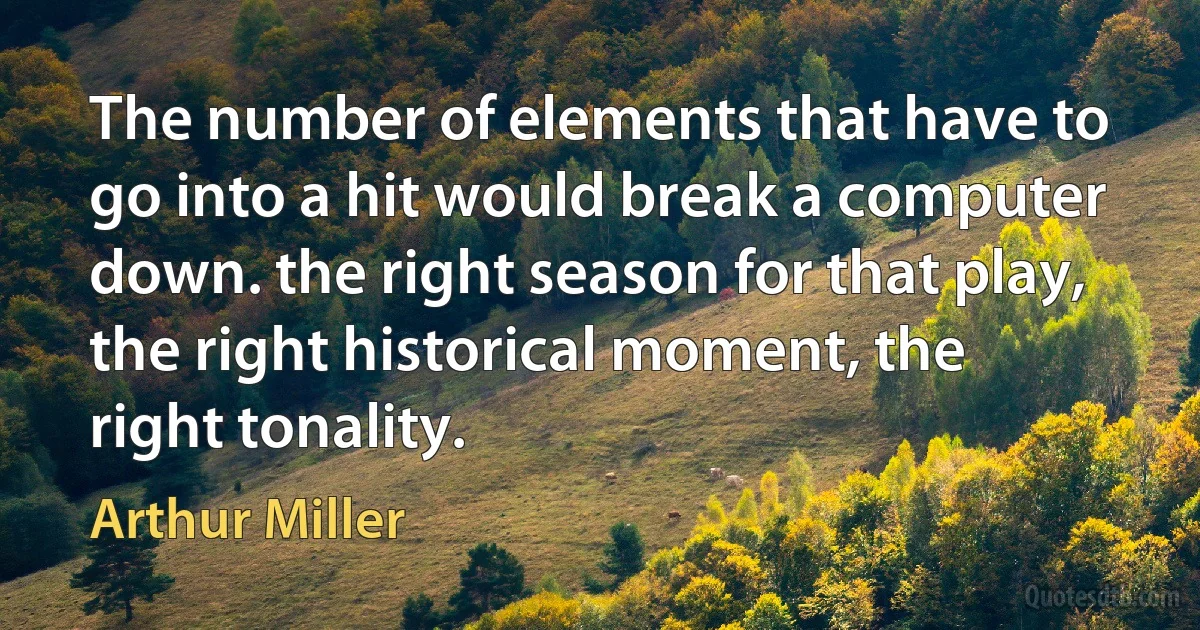Tonality Quotes
I think the origin of all this clamour for tonality is not so much the need to sense a relationship to the tonic, as a need for familiar chords: let us be frank and say "for the triad"; and I believe I have good reason to say that just so long as a certain kind of music contains enough such triads, it causes no offence, even if in other ways it most violently clashes with the sacred laws of tonality.

Alban Berg
The East is unfamiliar with those confessions, memoirs, and autobiographies so beloved in the West. There is a clear difference in tonality. One's gaze never lingers on the suffering humanity of Christ, but penetrates behind the kenotic veil. To the West's mysticism of the Cross and its veneration of the Sacred Heart corresponds the eastern mysticism of the sealed tomb, from which eternal life eternal wells up.

Paul Evdokimov
In the passage quoted here from Monteverdi's madrigal [Cruda amarilli, mm.9-19 and 24-30], one sees a tonality determined by the characteristic of the accord parfait on the tonic, by the sixth chord assigned to the third and seventh degrees, by the optional choice of the accord parfait or the sixth chord on the sixth degree, and finally, by the accord parfait, and above all, by the unprepared seventh chord (with major third) on the dominant.

François-Joseph Fétis
Any text in spoken English is organized into what may be called 'information units'. (...) this is not determined (...) by constituent structure. Rather could it be said that the distribution of information specifies a distinct structure on a different plan. (...) Information structure is realized phonologically by 'tonality', the distribution of the text into tone groups.

Michael Halliday
A musical event in Münich has brought me a great dolt.... an evening of chamber-music by Arnold Schoenberg (Vienna).... the audience behaved loutishly, like school brats, sneezing and clearing their throats, when not tittering and scraping their chairs, so it was hard to follow the music. Can you imagine a music in which tonality (that is, the adherence to any key) is completely suspended? I was constantly reminded of Kandinsky's large composition which also permits no trace of tonality.... and also of Kandinsky's 'jumping spots' in hearing this music [of Schoenberg], which allows each tone sounded to stand on its own (a kind of white canvas between the spots of color). Schönberg proceeds from the principle that the concepts of consonance and dissonance do not exist at all. A so-called dissonance is only a mere remote consonance – an idea which now occupies me constantly while painting..

Franz Marc
The musical language which made the classical style possible is that of tonality, which was not a massive, immobile system but a living, gradually changing language from its beginning. It had reached a new and important turning point just before the style of Haydn and Mozart took shape.

Charles Rosen
The relation of tonic to dominant is the foundation of Western triadic tonality. The attempt of the early nineteenth century to substitute third or mediant relationships for the classical dominant amounted to a frontal attack on the principles of tonality, and it eventually contributed to the ruin of triadic tonality. This ruin was accomplished from within the system, however, as mediant relationships were essential to tonality as conceived in the eighteenth century.

Charles Rosen
I think there are some objective [musical] qualities... how complex something is, how melodic, how diverse the tonality is, et cetera. But I could also make a piece of music that contains all of those and yet isn't "good" from a subjective viewpoint. For example, take Beethoven's "Moonlight Sonata", Beatles "Yesterday", and Underworld's "Born Slippy", and play them all on top of each other at the same time. Great music in their own right, but terrible sounding together.

Andrew Sega
'Love' has that Kubrick tonality to it, but this is not a Stanley Kubrick movie - there will never be another. At the same time, 'Love' has a modern feel. For example: In one scene, these astronauts go through a wormhole sequence, and you feel like you're being slapped around inside your head by a sonic boom.

Tom DeLonge

!["If these experiences [of union with the Absolute] are rare, nonetheless they lend their fundamental tonality to the Plotinian way of life, for that way of life appears to us now as a waiting for the unforseeable surging-forth of these privileged moments which give their full sense to life. (Pierre Hadot)](https://cdn.quotesdtb.com/img/quotes_images_webp/44/pierre-hadot-absolute-full-425844.webp)
![Can you imagine a music in which tonality (that is, the adherence to any key) is completely suspended? I was constantly reminded of Kandinsky's large composition which also permits no trace of tonality.. ..and also of Kandinsky's 'jumping spots' in hearing this music [of Schönberg ], which allows each tone sounded to stand on its own (a kind of white canvas between the spots of color). Schönberg proceeds from the principle that the concepts of consonance and dissonance do not exist at all. A so-called dissonance is only a mere remote consonance – an idea which now occupies me constantly while painting.. (Wassily Kandinsky)](https://cdn.quotesdtb.com/img/quotes_images_webp/46/wassily-kandinsky-adherence-canvas-1008946.webp)
